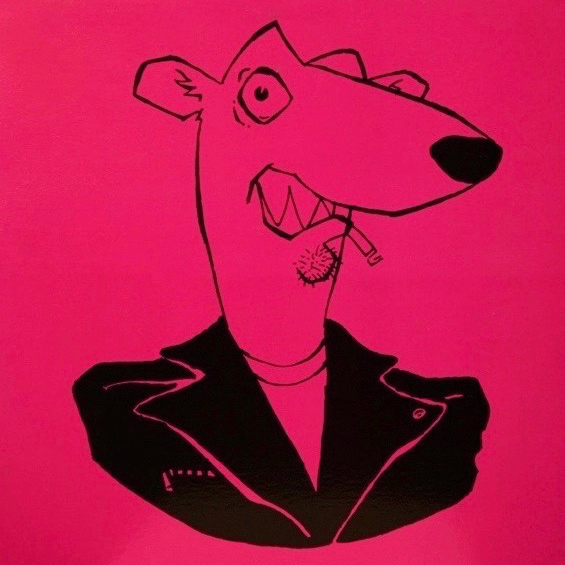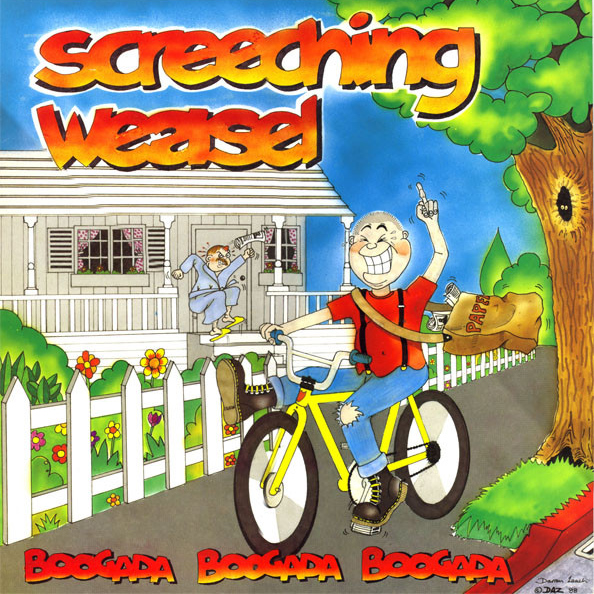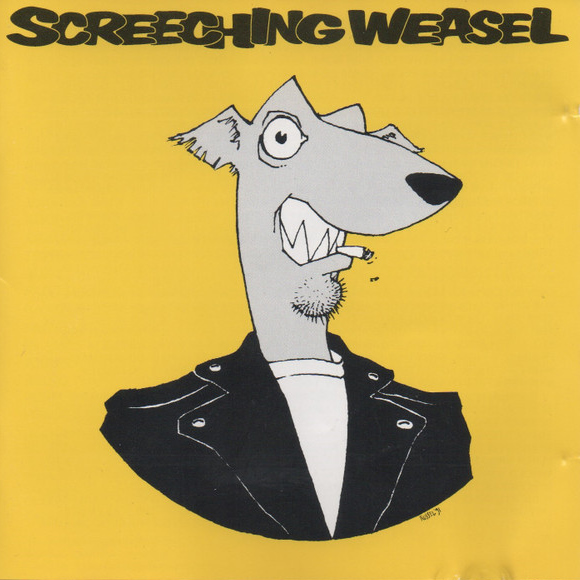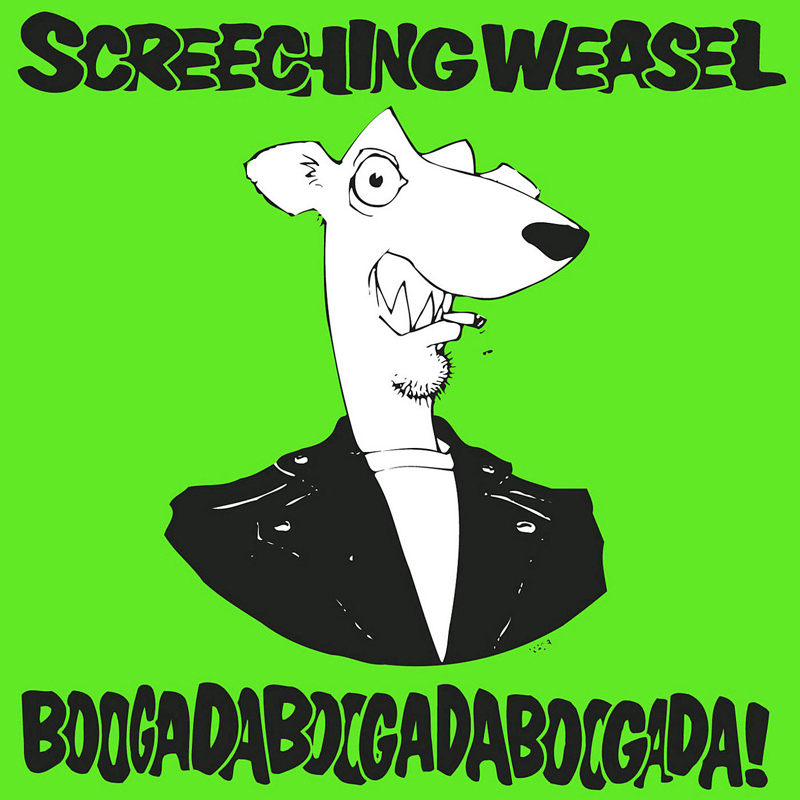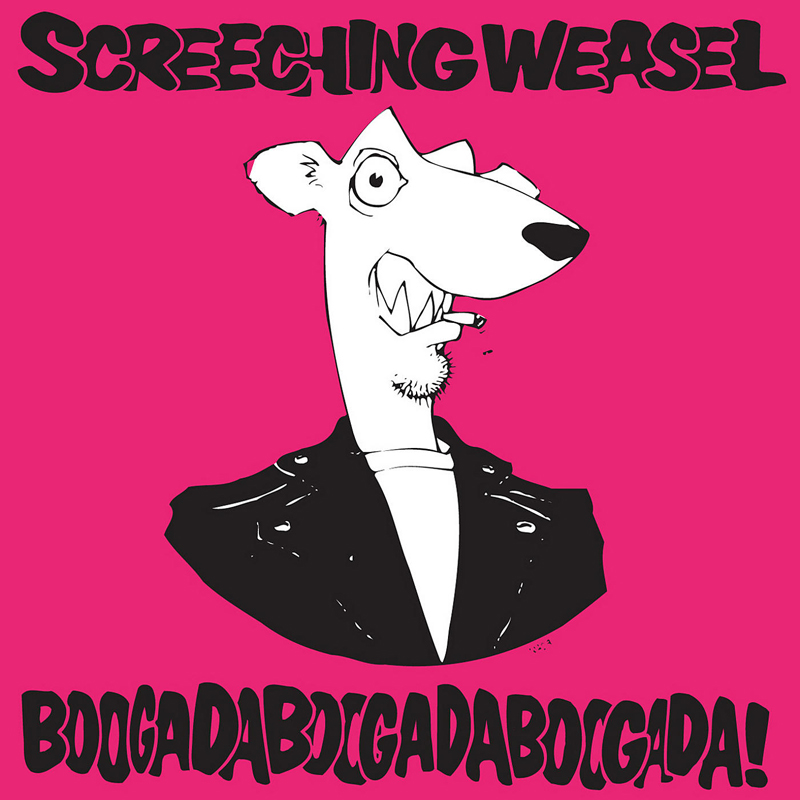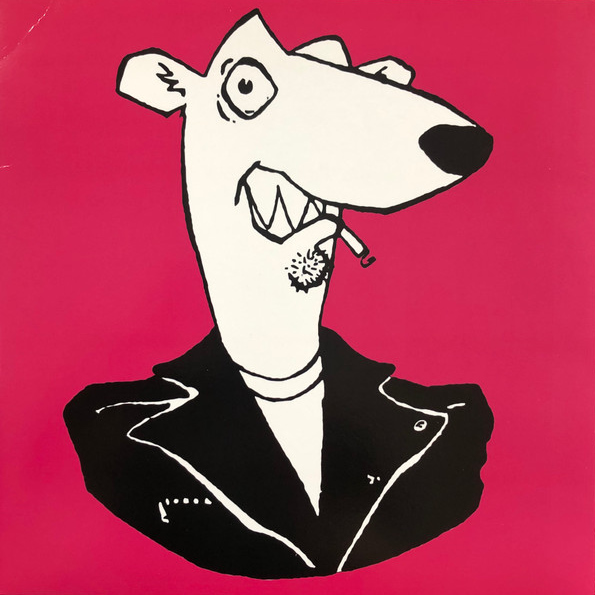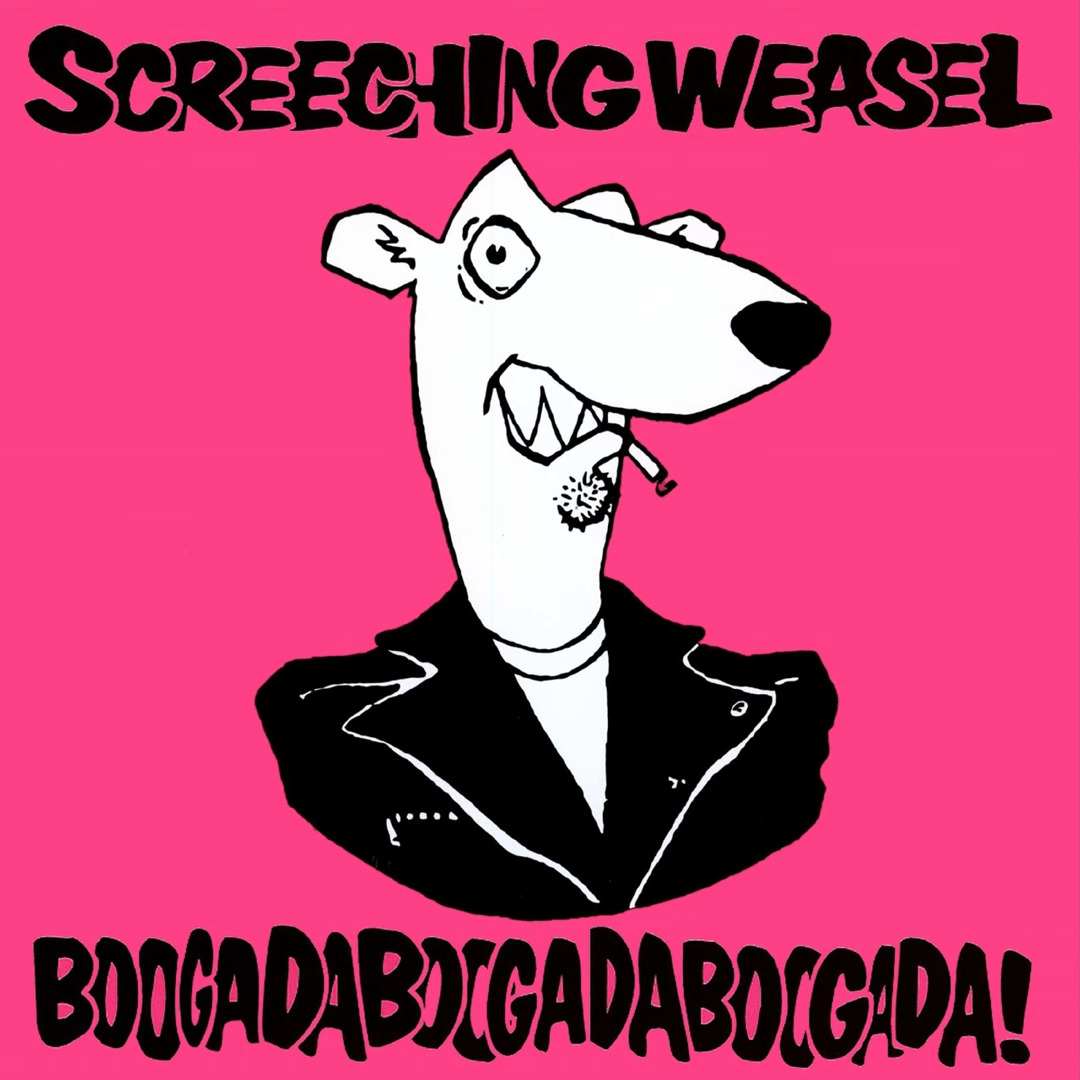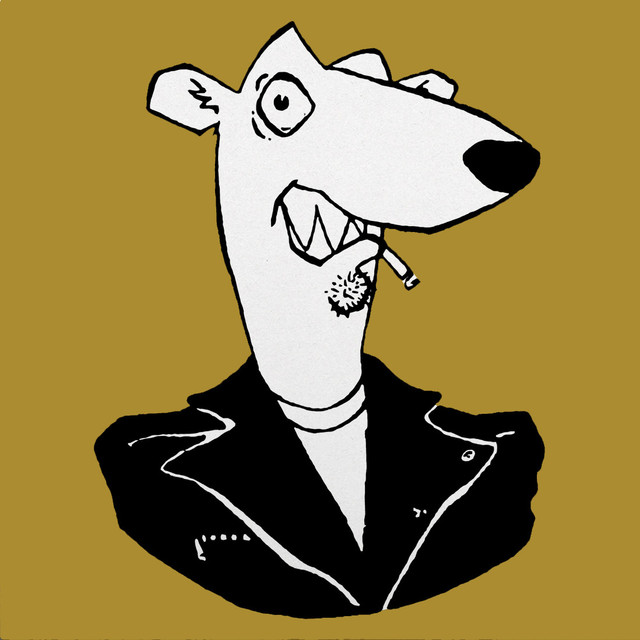Boogadaboogadaboogada! (1988)
TRACKLIST- Dingbat
- Love
- Zombie
- This Aint Hawaii
- We Skate
- Police Insanity
- Stupid Over You
- Runaway
- I Hate Led-Zeppelin
- My Right
- Nicarauga
- Sunshine
- I Wanna Be Naked
- Boogada (only on 1988 Roadkill and Wetspots releases)
- Ashtray
- American Suicide
- Psychiatrist
- Mad At The Paper Boy
- I Love To Hate
- More Problems
- Supermarket Fantasy
- Holy Hardcore
- Professional Distribution
- Used Cars
- Hunter
- I Believe In UFO's
- Hey Suburbia
LINEUP
Ben Weasel - voice, guitar
Jughead - guitar, backing voice
Fish - bass
Steve Cheese - drums
PRODUCTION
Recorded October 8, 9, 15, & 16, 1988 at Solid Sound. Engineered by Phil Bonnet.
Produced by Ben Weasel and Jughead. Jacket art by Paul Russel.
Re-release mastered by Mass Giorgini at Sonic Iguana.
LINER NOTES (2005 & 2010 Re-release)
1988: It was the year of Prince's Black Album and George Michael's Faith, Guns N Roses Appetite For Destruction and U2's Rattle & Hum. It was the year of Tiffany and Tracy Chapman, Sonic Youth's Daydream Nation and The Pixies Surfer Rosa, Michael Jackson bought Neverland Ranch in 1988: Sonny Bono was elected mayor of Palm Springs, California. And as far as punk rock, well, there really wasn't anything called "punk in 1988. It was all "Hardcore," whether you were talking posi-crew singalong slop like 7 Seconds or knuckle-dragging, Neanderthal streetcore and thrash metal from New York City like Agnostic Front and Warzone. And what about the Ramones, you ask? They were arguably at the nadir of their long career in 1988, a tired touring act that had released the execrable Halfway To Sanity in 1987. (They'd rebound a bit in 1989 with two semi-hits, "Pet Sematary" and "Merry Christmas (I Don't Want To Fight Tonight)" off the Brain Drain LP. But they were still a long way from being considered cool by anybody, even their old fans.) Oh, there were stirrings. In Berkeley, an upstart label called Lookout Records had released an EP by a young band called Operation Ivy that was discernibly different - catchier, lighter, more upbeat, more refreshing - than the standard breakbeat hardcore of the day. And a group with the irredeemably silly moniker of The Mr. T Experience had already released two records by then that provided a glimpse of pop-punk's future (not that anybody outside of a handful of friends had heard them, given their woeful lack of distribution in the U.S) And that brings us, somehow, to the record (well, okay... the CD) you're now holding, Screeching Weasel's second album, Boogadaboogadaboogada! Listening to it today, it sure sounds like another hardcore record, what with all those warp-speed vocals and those thrashy guitars, arguably it's not even as punk rock as Naked Raygun's Jettison, certainly the biggest hardcore record out of Chicago that year. But listening to Boogada3 for the first time in New Jersey, with my copy of Adrenalin OD's Cruising With Elvis In Bigfoot's UFO EP spinning constantly on my turntable I heard something that I wasn't getting from Gorilla Biscuits and Bold (or U2 or R.E.M., for that matter.) I had come of age a decade earlier, pogoing to the Ramones, the Clash, the Buzzcocks and the Undertones. I missed the catchiness of those bands, the melodies and the big hooks. And there was something else about Screeching Weasel that I wasn't getting from the Hare Krishnas and the straightedgers who dominated the hardcore scene of the late Eighties - a sense of humor. Ben Weasel's lyrics could be alternately nasty, silly, acerbic, witty, trashy, or biting; sometimes they were just downright stupid, just like the Ramones, and that was okay too. Songs like "My Right" and "Nicaragua" might suggest the political awareness of Bad Religion (along with that band's trademark sonic guitars and big hooks.) but it all arrived side-by-side with the numbskull misogyny and aggressive bad taste of the Angry Samoans. "I Love To Hate," sang the Weasels, and I loved finding a band that wasn't shoving its head up its butt trying to be "positive," one of the buzzwords of the day. And while the hardcore/metal fusion of Eighties acts like the Cro Mags and that ilk led to a renaissance of the dreaded guitar solo, those stinging, catchy, one-string leads on Screeching Weasel songs sounded like nothing else going on in hardcore at the time. And then there's that overt homage to the Ramones at the end of "I Wanna Be Naked" Nothing special now, when the Ramones are routinely worshipped as punk rock saints. But in 1988? Brilliant!! How did I get into all of this? A year earlier, as the editor of Jersey Beat fanzine, I had been lucky enough to score a copy of the band's eponymous debut LP from a friend at Underdog Records. Even though there's not much on Screeching Weasel that anyone remembers today (except perhaps "Murder At The Brady House," still being covered by the Queers,) that record - with its tacit homage to Ramones-era punk and its ingenious and funny artwork and liner notes - blew me away, enough so that I actually flew out to Chicago for a vacation that summer to meet the band. I actually visited Ben Weasel's family at their suburban home in Prospect Heights, a suburb of Chicago, and got to see one of the last shows with the original Screeching Weasel lineup. (With all the fighting and shouting that went on that day. I knew that lineup wasn't going to last very long.) Sure enough, bassist Vinnie Bovine was soon replaced by Warren Ozzfish (identified as "Fish" on the liner notes, whose band The Ozzfish had been the subject of the shout-out song "Experience The Ozzfish" on the first LP.) Meanwhile, Ben and John had teamed up with a college textbook salesman named Dave Best, who used his sizable sales bonus to form Roadkill Records, whose first release was Boogada3. Drummer Steve Cheese played on Boogadaboogadaboogada (and posed for the naked bowling photo that accompanied the first pressing of the LP) but by the time the record was actually released, he had been replaced by 16-year old Brian Vermin. I don't remember well enough to argue over which was the better drummer, but Brian had two assets that Steve couldn't match: his parents had a basement that the band could practice in for free, and as soon as Screeching Weasel started touring, baby-faced jailbait-aged Vermin developed a penchant for running around naked at shows, which impressed at least a few club bookers. Fans familiar with Screeching Weasel's success and popularity throughout the Nineties might be surprised to learn that Boogada3 was not a huge hit on its release; thanks to Ben's ongoing war with the powers-that-be in the Chicago hardcore scene, the band wouldn't play The Metro, Chicago's reigning rock venue. And while the DIY spirit of the Eighties got Screeching Weasel out on the road, their early tours were nothing to write home about. I'll never forget the band's first visit to New York on a frigid weeknight in the winter of 1989, when they played a skanky Lower East Side dive called The Lismar Lounge. The band had the bad luck to come into town on the same night that Sonic Youth was playing a benefit for the fanzine shop See Hear, so even the few New Yorkers who had heard of the band failed to show up. The Lismar Lounge had two levels an upstairs with a bar and pool table, and a ratty downstairs lounge with a small stage. There were a few tattooed, chain-smoking cretins upstairs that night, but even the sight of Brian Vermin streaking naked through the club couldn't entice them to come downstairs to hear the band, and so Screeching Weasel played its first NYC show to an audience that consisted solely of yours truly and two dazed Japanese tourists who probably thought they were at CBGB. Things went so badly that Screeching Weasel actually broke up in 1989, only to re-form and sign to Lookout Records a year and a half later. By that time, the band consisted of what I'll always consider the classic Weasel lineup: Ben "Weasel" Foster on vocals, John "Jughead" Pierson on guitar, Danny "Vapid" Schafer on guitar and backup vocals, and Dan "Panic" Sullivan on drums. (A sizable cast of second guitarists and bassists continually came and went, especially for tours.) The catchiest songs from Boogada3 became crowd-pleasing favorites with that core lineup for the next several years - "Love," "This Ain't Hawaii," "Sunshine," "Hey Suburbia," and of course, "I Wanna Be Naked, which not only became the band's anthem and set closer, but also inspired various band members - and eventually, a big chunk of the audience to strip at the end of shows. (I'm not making that up; I have videos!) Boogagadaboogadaboogada remains Screeching Weasel's best-selling album ever; in large part, I think, thanks to those fans back in the Nineties who wanted to take home their favorite songs from the live show. If you're coming to it for the first time with this reissue, you might be surprised at how thrashy and unsophisticated it sounds, especially compared to the far crisper, cleaner-sounding, smarter and more melodic later albums. But I don't think you'll leave disappointed. Ben Weasel's punk snarl was never quite this snotty again, or the Screeching Weasel experience this intense: Twenty-six songs in 34 minutes? They just don't make 'em like that anymore -Jim Testa, 2004 JOHN JUGHEAD: We rehearsed once a week. It started with me, Ben and Steve Cheese. The first couple of rehearsals were just jam sessions with no real guidance in Ben's garage. I still have some tapes of our long rehearsals playing our three or four chords over and over again. We used to listen to those tapes searching for a potential song out of the long 10 to 15 minute stretches of distorted guitars and drums and Ben's spontaneous lyrics. Sometimes we would even crank up the low end and lower the high end on Ben's amp and guitar so that the guitar would sound more like a bass. None of us knew a bass player at that time, and none of us had one. Ben later picked up the bass, and if I'm not mistaken, that is what he used to write many of the earlier Weasel songs. When we acquired Vinnie through some mutual friends, we moved into Ben's basement. It was a pretty cool open space, and usually twice during our rehearsals Ben's mother would come down to drop off and pick up the laundry from the washer and dryer. Often we would stop while she was down there and go upstairs where she'd make us a bite to eat and give us some soda. Then we'd sit in the living room and watch Pee Wee's Playhouse. It was more like a weekly tradition than a band rehearsal. We got rid of Vinnie around the same time that Ben's parents moved out of state. Ben moved into my basement and the band rehearsals moved into a small room adjacent to the back of my garage. My neighbor Lou would stand by the fence and wait for me to pass by. He would say things like, "When are you guys going learn how to play?" and "Don't you know that there are noise ordinances?" and the guilt trip one like, "Why don't you help your Mom out and mow the lawn or get a real job?" My mother would shoo him away from the fence when leaving to go to work. I don't think our moms ever liked any of the music we played but damnit if they weren't supportive. BEN WEASEL: We recorded Boogada at Solid Sound with Phil Bonnet, who had engineered the first Screeching Weasel record. The budget was $2,000, which seemed like quite a lot of money, but we still had to move very quickly. We tracked everything in one night and mixed it on another night. Phil was was a very nice guy but he didn't do a very good job on the record. Initially, there were 2,000 copies pressed, with an additional 1,000 copies pressed by Wetspots, who had licensed it for the U.K. Wetspots never paid us, nor did EFA. EFA got a hold of the record in 1991 after it was pirated by a co-worker of the owner of Roadkill Record, the label that had originally released it. They sold another 2,000 copies. By the time Lookout re-released the album in 1992, it had already sold 5,000 copies, which was respectable in those days. The original cover art was just the weasel head as a black line drawing on a hot pink background. The British version featured a full color piece of art depicting an angry man shaking his his fist at a mischievous paper boy. The color scheme for the back color was changed to blue and green and the insert was printed on the sleeve. The Lookout version featured a modified weasel head done by the original artist. I never liked it as much as the original. The background was changed to green to signify that we were just trying to cash in, having had some success with our first LP for Lookout (and third overall), My Brain Hurts. JJ: Originally, the cover of Boogada was supposed to be a photo of a sculpture that my eccentric artist friend Doug created. He couldn't find a gallery to show his work so when he finished he just gave the sculptures away to friends. I received a thick hand made black vinyl frame, and inside was the front half of a pink skull with bulgy plastic yellow eyes and scarlet worms falling from its mouth. The sculpture was called Deception, I am not sure why he gave me a sculpture called Deception. Ben was fond of this sculpture that hung prominently in my room. We decided it was cool enough to put on the front of our then upcoming record. The skull was Pink! That element made it oddly entertaining. But the cost to get this image onto the front of our record would surpass our budget. We had no backup plan. The night before the art was due, Ben and I stayed up until dawn piecing together a new cover from cartoon art our friend Paul Russell had sketched for us. The pasting and the cutting was getting messy and monotonous, and our time was running out. As a last, and final last, resort we ran to Kinkos and enlarged a small picture of one of the many weasel caricatures Paul had drawn. We stuck it onto the art board. There was no pasting, no organizing of small hand cut pieces of paper. It was a very simple solution. And to make the record even cheaper we went with only two colors, black and pink. This last minute weasel is now tattooed over hundreds of bodies around the world. The weasel unanimously, and somewhat beyond our control, became our band logo. Now that weasel caricature is enjoying a fame that far surpasses that of the actual band. I suspect that that picture has helped to make this our largest selling record to date. BW: The band still hadn't locked into any kind of sound or style that was our own; what few bright moments there are on this album are probably a product of luck. The only thing we had going for us was attitude and that's what 95% of this album is: obnoxious, post-teenage attitude. Which I suspect is why this record has outsold our other titles by a mile. One of the things that really bothers me about this record is the poor vocal performance. Part of this was due to my unfamiliarity with my own voice. I had no idea how to use it, let alone control it, and I had nobody to give me any pointers. While many of my subsequent recorded performances were poor, it was due more to small recording budgets and low expectations than it was to me feeling like my voice was some sort of bizarre foreign object that seemed to have a mind of its own. Having said that, if somebody had told me at the time that the record would end up being required listening for young punk rockers, I would have been extremely pleased because that's more or less what I was shooting for. JJ: A few other songs from this record were recorded earlier on a demo that we specifically made to send out to labels. Not a single label was interested. We ended up getting together with a book salesman geek named Dave Best, who had a little cash to throw around. Ben, Dave and I started Roadkill Records, a label name of Dave's choosing, and we put out Boogada for the first time. For most of the time while running the label Ben and I lived in Dave's living room, rolling out sleeping bags every night. I would go home to the suburbs on weekends and sleep in my mom's basement. We left for an infamous tour in Ben's Chevy Malibu that year. While in hot and steamy Pensacola, a good 200 of our original vinyl copies of Boogada melted and reshaped themselves beyond playability. We played a show after a skateboard contest, which featured as prizes a box or so of records that we thought might still be playable. The winners were not impressed and most of them used their vinyl as frisbees out in the parking lot. There they sat until later that night when we felt obliged to walk around, pick up the useless pieces of broken and warped vinyl and throw them into trash receptacles.
Dingbat BW: "Dingbat" was one I liked a lot because it was one of the few on the record that I felt was pretty well written. I also played lead guitar on the track, as I did with several others on the album, and I worked very hard on getting that lead down so I wouldn't need to spend a lot of time doing multiple takes in the studio. One of the cool things about starting a band in spite of having virtually no musical talent is that little things seem very impressive to you; changing the rhythm a little bit and playing a variation of the lead in the middle of the song seemed remarkably clever to me at the time. This Ain't Hawaii BW: when we met the queers in 1992 Joe King told us he'd ridden the song called "This Ain't Hawaii" but never recorded it. Juvenile minds think alike, I guess. Some dumb jerks would say, "Hey, let's go to Willamette Beach" and the rest of the dumb jerks would say, "Yeah, okay!" And then we'd have a miserable time getting drunk and being accused by the rich kids of stealing wallets. The song is a pretty good example of how not to write a song. I was much more interested in the structure and the lyrics so I didn't give a whole lot of thought to the music. I don't think the song holds up very well. We Skate BW: "We Skate" was sarcasm that didn't take. People still ask me if I was a skater. I wasn't. None of us were. Stupid Over You BW: "Stupid Over You," despite the weak lyrics, was probably my best attempt to date at finding my own style and voice; I don't think the song would have been out of place on some of our better albums like "My Brain Hurts." I Hate Led Zeppelin JJ: Screeching Weasel may have never made it into the mainstream, but the song "I Hate Led Zeppelin" is infamous among an enormous amount of classic rock connoisseurs in Chicago. Jonathan Brandmier, the Chicago '80s and '90s dj icon, had a love/hate relationship with his classic rock obsessed audience. Whenever a Led Zeppelin song would be requested he played the rousing chorus of "I Hate Led Zeppelin." He never announced the band's name, but around town I would hear people break into this chorus whenever someone mentioned the name of Led Zeppelin. Even to this day, I'll occasionally run into a denim clad classic rocker who remembers with a nostalgic sneer the punk chorus that insults his favorite band. My Right BW: "My Right" was one of my first experiences of releasing a song that went over well with fans that didn't do much for me; I grew tired of it a few seconds after we'd recorded it. Nicaragua BW: "Nicaragua" did not help to increase our popularity with the more P.C. scenesters. It's in the same camp as "I Hate Led Zeppelin" in that the sole intention was to irritate people. It worked. Sunshine BW: The only notable thing about "Sunshine" is its obvious Crimpshrine influence on the outro. I'd become a fan of the band that year and would write many songs under their influence. I Wanna Be Naked JJ: "I Wanna Be Naked" was one of our most requested songs. It was a local phenomenon. We would play the first couple chords of the song and punks in the audience would begin peeling their clothes off. Many times, especially during our Chicago shows at McGregors, I would look out into the mosh pit in front of me and shake my head and amazement and awe. Boys and girls, some completely naked, others in their undies and bras, all of them slam dancing! Sometimes adventurous women would take off their bras, and I think on a few occasions I remember some punk chicks in the raw. If this wasn't strange enough when the song stopped so would the loss of inhibitions. Most of the naked people with scatter, toss their clothes quickly back onto their bodies and hide themselves in the crowd, as if the song had hypnotized them. At one of our last shows at McGregors a group of kids known as the Polish Punks outdid themselves. When the first couple chords started, they approached the front of the stage completely clothed with ear-to-ear grins across their faces. When they knew they had our attention they dropped their drawers and each kid had his own wang costumed to look like animals from a zoo. There were elephants, giraffes, and anteaters. Oh My! BW: "I Wanna Be Naked" is one of many thorns in my side. Record the song, play the song live, have some drunk yell "Well if you wanna be naked, why don't you get naked?" And because you're so drunk, you strip down and some sort of asinine tradition is born. It was funny at first, but it got boring very quickly. Ashtray BW: "Ashtray" was an obvious owed to punk house life as well as a tribute to our Oakland pals who chose to live in a manner that made us feel extremely neat and tidy by comparison. I did think it was a pretty ballsy song, but I was really annoyed by our inability to get any low end into our sound. It took me a few years to realize that the problem was due to the little practice amps we played through. Mad At The Paper Boy BW: The idea with "Mad At The Paper Boy," as was the case with a lot of my songs at the time, was to do sort of a musical comic strip accompaniment to suburban life. We had learned from New Jersey's Adrenaline O.D. that it was far cooler to be from the suburbs and write about that then it was to be from the suburbs and pretend like you grew up on the mean streets. I Love To Hate BW: "I Love To Hate" was very funny to me when I was 19. The Sharon Tate line seems a bit much now although I still get a giggle out of it. Not so funny is the two-obvious attempt to tap into The Angry Samoans vein. Supermarket Fantasy BW: "Supermarket Fantasy" came about after a late night trip to the grocery store to find some bug spray to kill the army of spiders that Crimpshrine left in the room Jughead and I shared. Two minutes in that supermarket was all it took to know that 2:00 a.m. on a weeknight at the local Cub Foods was the place to try to hit up on insomniac housewives. Holy Hardcore BW: I have a sneaking suspicion that a few of the more simple-minded punks thought we were religious. Sorry, but I never asked myself "What Would Jesus Do?" - I preferred to ask "What Would Jake Filth Do?" Proffessional Distribution BW: "Professional Distribution" was about a dopy local record label run by a couple of slick industry types. We didn't make any friends with that one, which by then was the whole point of the band Used Cars JJ: Ben wrote "Used Cars" after we had a confrontation with a used car salesman in the suburbs. We had a long history of trouble when it came to finding a vehicle in which to tour. Ben and I weren't mechanics, we just wanted to find a piece of junk that would last at least 2 to 3 weeks on the road! We gathered together the few bucks that we had earned working with my brother filing off aluminum shards from freshly constructed metal pipes. Every night after a 9-hour day we would come home to my basement bedroom that we shared covered in dirt, sweat, and tiny slivers of aluminum that would dig deeper into your skin the more you tried to rub them out. Sometimes I would have to carefully pull one out of the corner of my eye. We found the dingiest looking car lot on the outskirts of town, hoping to fall upon a great deal. After the portly, rambunctious and desperate salesman/ manager showed us a plethora of homeless vehicles without floorboards or bumpers, or when it came down to it they actually didn't start, he lastly showed us a minibus. It was an actual mini school bus built to transport the "special" kids from door front to door front. Ben thought this would be awfully cool to drive. We stepped in, and it sort of felt right. It was no golden gate bridge but it was the shiniest piece of crap in an ocean of shit. The man saw her interest and he quickly pulled the price tag off the window and hit it behind his back. "One thousand dollars, boys. And it's yours!"but it was only a pipedream, We were no haglers, and in the long run I think the burn marks around the motors hub by the steering wheel was a good sign that we were not fit for this school bus. We weren't made to be the mechanics or drivers of this vehicle, we more resembled the special kids in the back seats that needed to be carted from place to place. Hunter JJ: "Hunter" The only song record written from start to finish by Warren Fish, One of two members of the obscure punk rock duet known as Ozzfish. The song was to first appear on a split 7"featuring SW on one side and Ozzfish on the other. Both bands went into the studio together and recorded about 4 songs each, the 7" was to be a joint release sold mostly at a record release party about 2 months down the line. Warren was the mastermind behind this project. Both bands put in their initial 500 bucks and sat back and waited for the vinyl to show up. A few weeks before the record release Warren received two test pressings. He clothed them in two of 1, 000 multi xerox copied paper sleeves that he hand copied at the Kinkos. He gave a copy to me and Ben and kept the other for himself. Ben and I took it home and played it on my turntable to make sure it sounded fine; no skips, or missing grooves, like our first record. The vinyl passed the test. We told Warren to push forward. Later down the way at the record release, a few hours into the night Warren arrives without the 7"s. "They fucking didn't show up, man!" That was fine, we gave people little slips of paper that said, "Weasel owes you one vinyl 7 inch." A few days pass, we get a call from Warren. The pressing plant burned down, we not only lost the 1,000 7"s We were to receive, but the only master copy of the songs had gone up in flames. The company went bankrupt and both bands lost a total of $1,200 in recording, copying, and manufacturing costs. The only good thing to come from this experience is my ability to look at this memory while still holding one of two of the most rare 7"s probably ever recorded by any two punk bands. I Believe In UFOs JJ: SW has always been a pretty straight forward go into the studio and record your parts type of band. For "I Believe In UFOs" we actually took some time to screw around with effects. After years of "experience" in the studio what we did back then now seems basic, but while recording funny sounds with loud headphones on it 3 or 4 in the morning I felt like we were adventurers walking into space creating some magnificently complicated punk rock concerto. Hey Suburbia BW: "Hey Suburbia" was a big old anthem, but I think we did the song much better on the "Kill The Musicians" version, which featured an ending that was fleshed out and some really great backing vocals from Vapid. Up until now I'd always assumed that John and I had worked on the song together but I could never remember which parts he wrote. JJ: It's my belief that "Hey Suburbia" is the song that has come to represent SW's placement in any kind of Punk Rock history. It is about living in the suburbs, a continuing theme for the suburban vermin, and it is the earliest example of the recurring melodic solo that we had nurtured. And still, to this day, Vapid, Ben, and I explore this melodic solo in our new bands. We would end our sets with this song or Wanna Be Naked. On the record Ben and I are credited for writing this song. My credit is more of an ambiguous contribution. We would sit around and he would show me parts that would later show up as songs. I wasn't a very good co-writer with Ben, that position would be filled on the next record by Vapid. Man, those two boys are magic to watch creating a simple punk rock song. When Ben was showing many of the new parts to me, I showed him a series of chords I was playing with, these would a few days later become the chorus for "Hey Suburbia". The funny ambiguous part is, and I know it's true because I've done it myself, Ben brought the song in completely unaware that he had incorporated my chord progression. So am I a co-writer? Sometimes in music it's hard to tell, but it's a great song and I am happy to have a credit on something seen as part of pop punk history.

